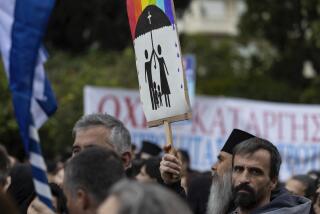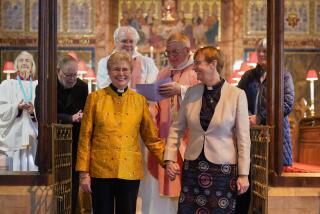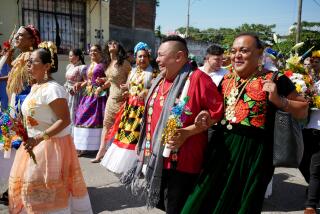A Long Road From Fascist Era to Gay Marriage
MADRID — The groom wore white. The other groom wore orange. Both trimmed their mustaches for the Big Day.
After 30 years together, Carlos Baturin and Emilio Menendez tied the knot last week in a suburban Madrid city hall, becoming the first Spaniards to avail themselves of one of the world’s most liberal laws sanctioning homosexual marriage.
The new rules have put Spanish authorities into bitter conflict with the Roman Catholic Church and revived angry rhetorical ghosts from Spain’s civil war, when the church backed dictator Francisco Franco and homosexuality was a crime.
The church has branded the law, a pet project of Socialist Prime Minister Jose Luis Rodriguez Zapatero, as nothing less than an unprecedented threat to Christian civilization. When the Socialist-dominated parliament approved gay marriage this spring, a senior cardinal at the Vatican called on Spanish officials to refuse to enact the law.
Several mayors jumped on the bandwagon and declared their defiance, saying they would refuse to marry gay couples as a matter of conscience. (In Spain, couples have to undergo a civil ceremony officiated by a mayor or city official and may then opt for a religious wedding in addition.)And so, amid the furor, Baturin and Menendez said their vows before a suburban alderman from the United Left party, witnessed by a dozen of the couple’s closest friends and relatives, and about 100 journalists, photographers and TV cameramen. “It is a testimony to who we are and what we are,” said Baturin, a psychiatrist. “Now we are more official. We both believe in marriage and family, and we wanted to be part of that.”
Menendez’s 88-year-old mother, Marina, gave the couple an Adriatic cruise as a wedding gift. She attended the ceremony and was reported to be in excellent spirits and proud of her son, for whom growing up gay in Franco’s Spain was not easy.
As a youth, Menendez completed military service in the Spanish army, finding a niche with other gays like himself, none of whom could reveal their sexual orientation openly but who could protect each other.
“We knew how to hide it,” Menendez said. “It was a clandestine way of living, and not just because of being a homosexual. The ‘70s were a time when you spoke softly about certain things, and only in private.”
Franco died in 1975, a few months after Baturin and Menendez started dating, secretly, and the transition to democracy in tradition-bound Spain was launched.
A few days after the wedding ceremony, the newlyweds were still basking in the glow of marital bliss, sitting in the lobby of their favorite gym and receiving congratulations, kisses and handshakes from passing friends.
Menendez, a window dresser for Spain’s leading department store chain, El Corte Ingles, said he remained disappointed that his church had so vociferously opposed gay unions.
“The first commandment is to love each other, and the church has lost a beautiful opportunity to show love,” he said. “It makes me very sad.”
Baturin and Menendez are around 50 (they won’t give precise ages, they say, out of vanity) and clearly comfortable with each other, an ease born of many years as a couple. Baturin, a little older than Menendez, has close-cropped blond-white hair, intense eyes and an angular, thin face. Menendez has wavy, dark hair and a dimpled smile.
For the wedding, Menendez, the shopper of the family, chose striped jackets for the pair, beige for himself and blue and white for Baturin. Menendez added an orange shirt, and Baturin donned a white shirt and trousers. They exchanged white-gold rings, each inlaid with a diamond.
They say they had intended to keep the ceremony low-key but that journalists got wind of the historic event and descended on City Hall. Guests threw rice and rose petals to greet the newlyweds, but the pair declined to kiss in public.
Although numerous countries today recognize some form of same-sex partnership, the Spanish law goes beyond most because it eliminates all legal distinction between heterosexual and homosexual marriages. A gay married couple has all the same rights as a straight married couple, including the right to adopt children. A similar law exists in the Netherlands, and one is pending in Canada.
Zapatero says the law will help transform Spain into a new and “decent society.” His agenda also includes plans to liberalize divorce, abortion and stem-cell research. But the church is incensed, saying the very definition of family is being destroyed.
To underscore their point, church leaders took the unusual step of joining forces with the political right wing and heading a massive street demonstration last month to demand that the traditional definition of marriage be preserved.
Many on the left warned of a throwback to the days of Franco, when the church and fascism worked hand in hand. But political leaders on the right, including Mariano Rajoy, the head of the Popular Party ousted last year by Zapatero’s surprise electoral victory, blamed the Socialist government for sowing division.
Though Spain is traditionally a Roman Catholic country, Spaniards are increasingly less likely to go to Mass and follow other religious customs.
Rajoy and some of the opponents of gay marriage say they don’t mind legislation recognizing civil unions for homosexuals. They draw the line, however, at giving it a status equivalent to the marriage of man and woman.
The issue has roiled debate in a number of countries, including the U.S. The Bush administration and its conservative backers are promising to fight the kind of same-sex unions that a number of jurisdictions have enacted.
“We’ve been awakening a lot of awareness,” said Benigno Blanco, vice president of the Spanish Family Forum, which organized the protest march and has collected half a million signatures to force a new law that would define marriage as the joining of a man and woman. “This is what Spaniards really want. The marriage of husband and wife is the natural niche from which new life arises.”
And so, as Baturin and Menendez take off on their honeymoon, Spaniards will continue to debate how far and fast their society is changing, and whether some changes are long overdue or too much at once.
“The legal relationship between homosexuals must be different from conventional marriage,” Mario Amilivia, the mayor of the city of Leon, said in a statement explaining his decision to refuse to marry gays. “This type of thing only generates friction in society, in a gratuitous way.”
More to Read
Sign up for Essential California
The most important California stories and recommendations in your inbox every morning.
You may occasionally receive promotional content from the Los Angeles Times.











